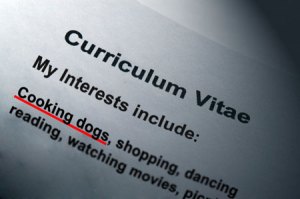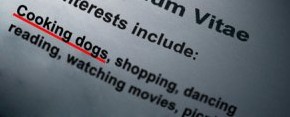Avoid Making Common Resume Mistakes
Given below are some common resume mistakes people make:

1. Unfocused resumes
A resume must have a sharp focus. It is one of the most important elements. Employers and recruiters often spend around 6 seconds or so per resume nowadays, so it is important that they get an idea of what you want and what you can you do at a glance.
According to studies, recruiters prefer resumes that clearly match the job requirements. Generalized resumes without any focus on the particular requirements of a job are not competitive at all. In fact, over 70 percent of recruiters and HR managers prefer resumes that are customized for the job opening.
One of the best ways to sharpen your resume’s focus is to add certain verbiage at the top that catches the attention of the reader and lets him or her know the areas in which you can excel. The verbiage can be written in the following ways:
- With a headline, which is generally the title of the position advertised, so that you can adjust it according to the job you apply for
- A branding, ad-like statement that immediate tells the employer what you have to offer
You can also add sections in the beginning like ‘qualifications summary’, ‘profile’, etc. Such sections can be written in bullet points so that recruiters can quickly go through them. A general rule to follow is to keep these sections within the top one-third portion of your resume.
2. Resume focuses on duties rather than accomplishments
A lot of job seekers write their duties when describing their previous jobs. However, resumes should primarily consist of accomplishments that portray the best of the candidate. Avoid using expressions like ‘responsibilities for’ or ‘duties included’, since they are generally for job description-based resumes and not accomplishment-based ones. In an age where recruiters filter resumes based on keyword searches, you will hardly ever find recruiters searching for resumes with words like ‘duties’ and ‘responsibilities’.
When writing your job history, note down the accomplishments you have achieved during your previous jobs that can set you apart from the rest. Think about how you have personally helped employers to:
- Save time/money
- Make more money
- Make work more efficient and easier
- Solve specific problems
- Beat the competition
- Expand business
- Retain old customers
- Gain new customers
Some applicants tend to list their accomplishments separately from their job descriptions. This can be counter-productive because it makes your resume unnecessary large, and a resume driven wholly by accomplishments is more efficient.
3. Unordered job histories
Job descriptions need to be set in a descending order of importance and interest. This means that the information that will most likely catch the interest of the recruiter should be added first. In the case of resumes, the most important information is your position. A good order for your resume is given below:
- Title/position
- Employer name
- City/state of the employer
- Date of employment
A lot of job seekers tend to write the date of employment first, but this is not as important for recruiters as the title/position held by the applicant. Moreover, some employers use Applicant Tracking Systems, and using the above-mentioned order can help your resume function better with such systems.
Even educational qualifications need to be written in order. A good order of educational information is given below:
- Name of the degree, fully spelt out, with the specified major
- Name of university
- City/state where university is based
- Graduation year
- Peripheral data, like average GPA and minor subjects
If you have not yet graduated, you can add the future graduation date without changing the order of information. Moreover, write down the educational qualifications that matter most to the job you are applying for. Others can be left out or put at the end.
4. Paragraph resumes
Resumes that use paragraphs of information are not very effective. Instead of this approach, you should use a bulleted style to make it more reader-friendly. Make sure you use bullets consistently. Do not use bullets in one section and switch to a paragraph-based style in other sections.
5. Resumes based on common templates
Many job applicants use the Microsoft Word template to write their resumes without knowing that recruiters instantly understand when it is being used. There is nothing wrong with this per se, but it makes the resume look unremarkable. At a time where recruiters are looking for any way in which resumes stand out from the rest, using such overused templates can make them think you lack imagination and conviction.
6. Resumes without keywords
Employers and recruiters are turning to keyword search databases to automate the first phase of resume filtering. Naturally, job seekers have to optimize their resumes accordingly for such keyword searches. Most companies that use such methods often add the keywords they are looking for right in the job advert. Therefore, it is a good idea to read the advert carefully and find the words that are most important. Add them to your resume, but only within a word density of 1.5-2 percent at most.
7. Resumes with direct references
Do not list specific references directly on your resumes. If you want to do it, make sure you list them separately and submit them only when you are asked to do so. You might be tempted to add the phrase ‘References available on request’, but you can leave it out without any negative consequences.
[INFOGRAPHIC: Top 10 Funny Resume Mistakes]
ABOUT AUTHOR:
Erik Larson is a master’s level career counselor and an internationally certified as a Career Management Practitioner (CMP) by the Institute for Career Certification International. He was also recognized as a National Certified Counselor (NCC) through the National Board for Certified Counselors. You can check out his site at ResumeIndex.com


